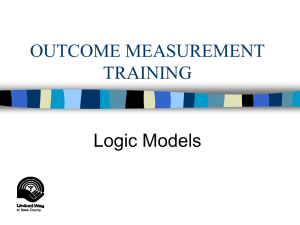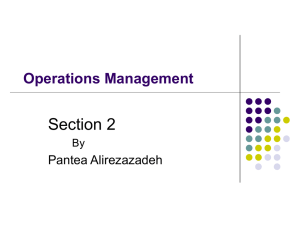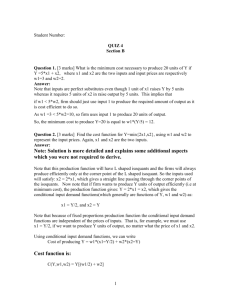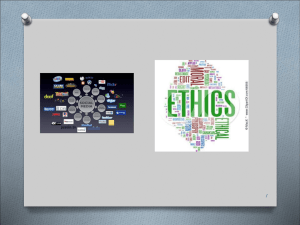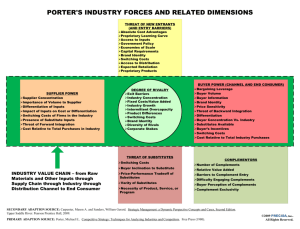OCR GCSE Computing - Deyes High School
advertisement
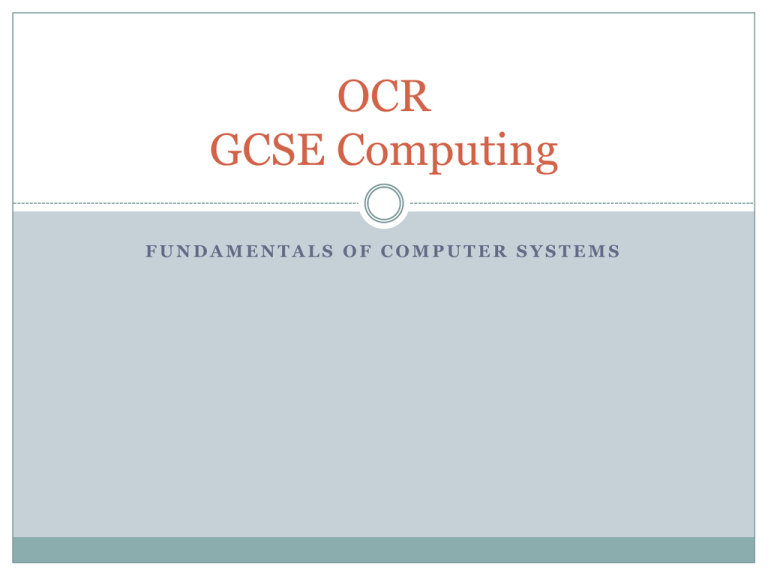
OCR GCSE Computing FUNDAMENTALS OF COMPUTER SYSTEMS 2.1.1 Fundamentals of computer systems Candidates should be able to: Define a computer system Describe the importance of computer systems in the modern world Explain the need for reliability in computer systems Explain the need to adhere to professional standards in the development, use and maintenance of computer systems Explain ethical, environmental and legal considerations when creating computer systems Define a computer system Takes a set of inputs, processes them and creates a set of outputs. Using hardware and software. Inputs provide data, the data is processed and the outcome is sent to an output. The output may be stored until it is ready to become an output. Program input process Storage output Examples of computer systems A computer system For processing to be done, there needs to be a set of instructions. This set of instructions is a program. This system is called a stored-program computer. Computer input The role of an input in a computer system is to provide data for further processing. An input is data or commands entered into the computer via an input device such as a keyboard, mouse, scanner, barcode reader etc. See inputs and how they work doc. Computer processing Processing is the stage where the input data is manipulated in order to produce meaningful information. The results from the processing can then be used in the next stage called “output”. Processing can include stages such as sorting, searching, calculations or graphing. Computer output Output is the stage where the information obtained via processing is presented to the user in a suitable format. You may be able to see the output as a printout or display on the computer screen. You may be able to hear the output via music, voice instructions or a computer generated alarm. See inputs and how they work doc. Task 1 • Create a short presentation describing the importance of computer systems in the modern world. Include information about: Why they need to be reliable? Why must we adhere to professional standards in the development, use and maintenance of computer systems? What ethical, environmental and legal considerations must be considered when creating computer systems? Standards Proprietary standards: Standards owned by the company. E.g. Windows must handle data in a certain way, communicate with the operating system in defined ways and work with a defined interface. Advantages Familiar look and feel to users which speeds up learning new systems Improves reliability by working in a practical way Maintained by one company so minor updates are usually free Standards Cont. Industry standards: Standards are agreed across the computing industry in particular with hardware. Allow easy interconnection between devices. E.g. USB which is the standard way of connecting devices to most computer systems. De facto standards: Standards developed through common usage until they are the accepted way of doing things. E.g. Car controls, most cars have indicator stalk on the left of steering column Standards Cont. Open standards: Standards that are publicly available so software can be modified by users. For software, the source code is available for the public so anyone can make changes. Examples include world wide web, HTML, TCP/IP and C# programming language. Examples of open source software are Mozilla Firefox, the Android operating system, Moodle VLE and Python programming language. Ethical, environmental and legal issues Ethical employment Environmental energy efficiency creation & disposal of hardware Legal The Data Protection Act, The Computer Misuse Act The Copyright, Design & Patents Act





